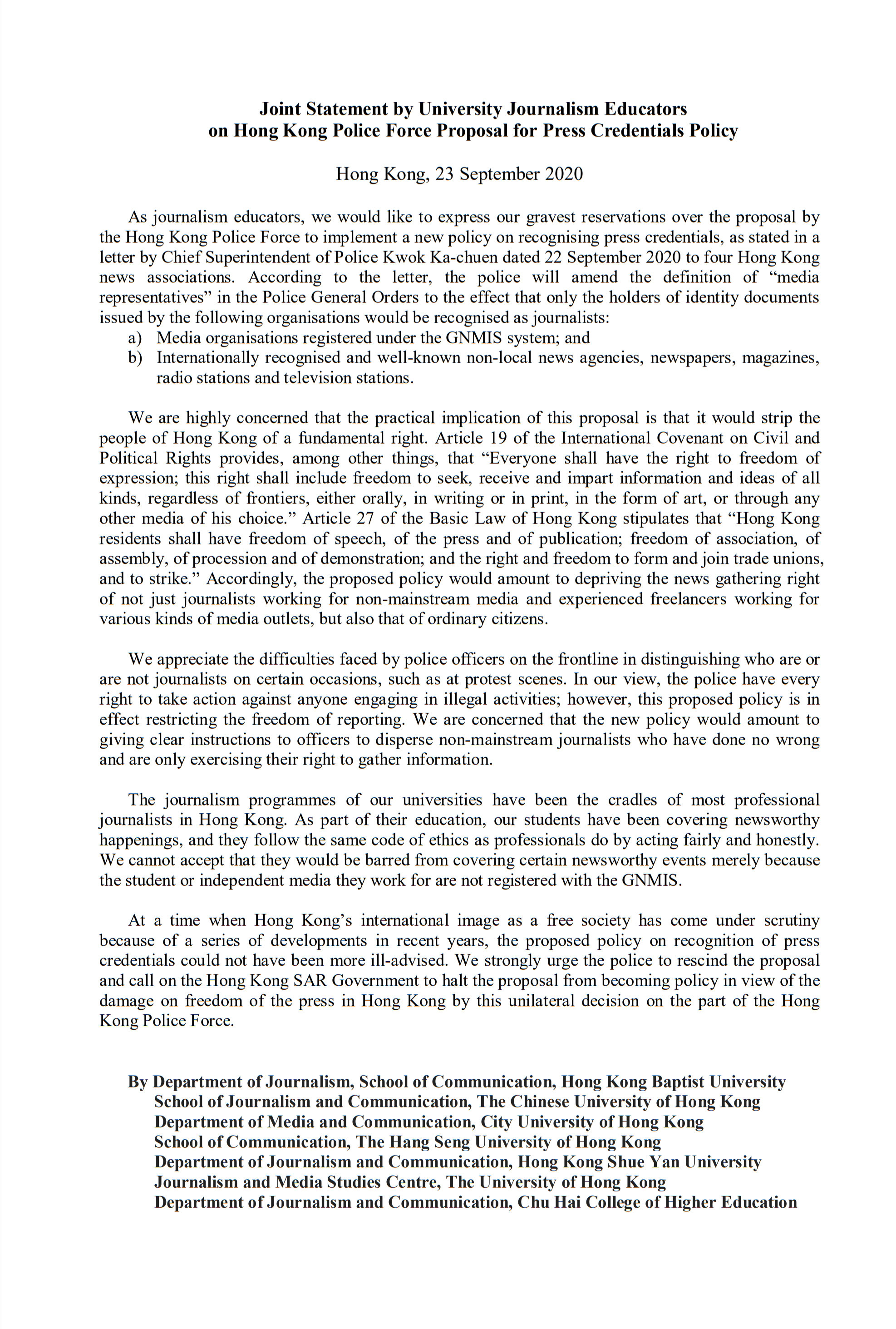Statement
Joint Statement by University Journalism Educators
on Hong Kong Police Force Proposal for Press Credentials Policy
Hong Kong, 23 September 2020
As journalism educators, we would like to express our gravest reservations over the proposal by the Hong Kong Police Force to implement a new policy on recognising press credentials, as stated in a letter by Chief Superintendent of Police Kwok Ka-chuen dated 22 September 2020 to four Hong Kong news associations. According to the letter, the police will amend the definition of “media representatives” in the Police General Orders to the effect that only the holders of identity documents issued by the following organisations would be recognised as journalists:
a) Media organisations registered under the GNMIS system; and
b) Internationally recognised and well-known non-local news agencies, newspapers, magazines, radio stations and television stations.
We are highly concerned that the practical implication of this proposal is that it would strip the people of Hong Kong of a fundamental right. Article 19 of the International Covenant on Civil and Political Rights provides, among other things, that “Everyone shall have the right to freedom of expression; this right shall include freedom to seek, receive and impart information and ideas of all kinds, regardless of frontiers, either orally, in writing or in print, in the form of art, or through any other media of his choice.” Article 27 of the Basic Law of Hong Kong stipulates that “Hong Kong residents shall have freedom of speech, of the press and of publication; freedom of association, of assembly, of procession and of demonstration; and the right and freedom to form and join trade unions, and to strike.” Accordingly, the proposed policy would amount to depriving the news gathering right of not just journalists working for non-mainstream media and experienced freelancers working for various kinds of media outlets, but also that of ordinary citizens.
We appreciate the difficulties faced by police officers on the frontline in distinguishing who are or are not journalists on certain occasions, such as at protest scenes. In our view, the police have every right to take action against anyone engaging in illegal activities; however, this proposed policy is in effect restricting the freedom of reporting. We are concerned that the new policy would amount to giving clear instructions to officers to disperse non-mainstream journalists who have done no wrong and are only exercising their right to gather information.
The journalism programmes of our universities have been the cradles of most professional journalists in Hong Kong. As part of their education, our students have been covering newsworthy happenings, and they follow the same code of ethics as professionals do by acting fairly and honestly. We cannot accept that they would be barred from covering certain newsworthy events merely because the student or independent media they work for are not registered with the GNMIS.
At a time when Hong Kong’s international image as a free society has come under scrutiny because of a series of developments in recent years, the proposed policy on recognition of press credentials could not have been more ill-advised. We strongly urge the police to rescind the proposal and call on the Hong Kong SAR Government to halt the proposal from becoming policy in view of the damage on freedom of the press in Hong Kong by this unilateral decision on the part of the Hong Kong Police Force.
Department of Journalism, School of Communication, Hong Kong Baptist University
School of Journalism and Communication, The Chinese University of Hong Kong
Department of Media and Communication, City University of Hong Kong
School of Communication, The Hang Seng University of Hong Kong
Department of Journalism and Communication, Hong Kong Shue Yan University
Journalism and Media Studies Centre, The University of Hong Kong
Department of Journalism and Communication, Chu Hai College of Higher Education



